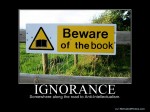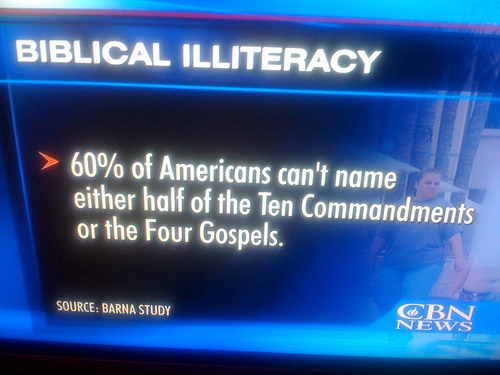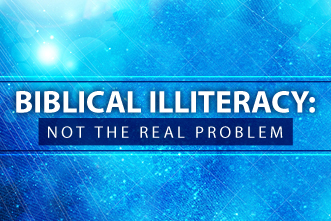Maybe it’s just me, but I seem to be running into more and more ignorant Christians who seem to think that the best way to learn theology is to not study it. When challenged on any of their theological beliefs, their only real defense is, “God revealed it to me.”
Here is how these discussions often go:
Ignorant Christian: I disagree with what you taught from the Bible today. You are wrong about _____.
Me: Well, I make no claim to infallibility. It is possible I am wrong. Why do you think so?
Ingorant Christian: Because you obviously haven’t read the Bible. If you had, you would know about Passage X, Y, and Z, which say this: (They then proceed to quote several verses to me from the Bible. I call this Shotgun hermeneutics.)
Me: I am actually quite familiar with those texts, and have studied them extensively. I just simply understand them in a different way than you do.
Ignorant Christian: Well, your way is wrong.
Me: Again, that is possible. Besides, I forgot that you are smarter than I am, and have more education than I do.
Ignorant Christian: Oh, you’re mocking me now? I may not have gone to Bible college or Seminary, but I know the Bible just as good as you do. In fact, it is at Bible college and Seminary that you learned all your heresies.
Me: Undoubtedly so. But tell me, where did you get your learning from? What books have you read? What teachers do you listen to? How did you gain the Bible knoweldge you have?
Ignorant Christian: I learned it all on my own. I don’t read any books except the Bible and don’t listen to any teachers except the Holy Spirit. Jesus has taught me everything I know about the Bible.
Me: Wow, I wish I was that spiritual… So have you ever been wrong in anything you believed?
Ignorant Christian: No, God wouldn’t teach me lies. Everything I learn from God is 100% accurate.
Me: …So you’ve never been wrong about anything?
Ignorant Christian: Of course I have! Just nothing God taught me. If I am wrong about something, I trust that God will teach me the truth as I study Scripture, pray, and listen to the instruction of the Holy Spirit. I don’t need human teachers or human books to teach me the truth.
Me: I see… So why are you correcting me again?
Ignorant Christian: Because you’re wrong.
Me: But you’re human, right?
Ignorant Christian: Of course. What are you saying?
Me: Well, you just said that everything you believe you learned from God through the study of Scripture and the instruction of the Holy Spirit, and that you don’t listen to human teachers or read human books, and yet here you are, a human, trying to instruct and correct me… It seems that if you really believed what you say, you would trust God to teach and correct me the way He teaches and corrects you.
Ignorant Christian: But you don’t believe God does that.
Me: I didn’t say that… I guess I’m just confused. You don’t want human teachers to teach and correct you, but you, as a human, want to teach and correct others?
Ignorant Christian: Because God has taught the truth to me, He has called me to teach that truth to others. And as you were teaching, He revealed to me that I was supposed to correct you.
Me: Well, thank you for being God’s mouthpiece. Please, next time you talk to God, tell Him that I am open to His instruction and correction, and that anytime He wants to correct my theology, He can come speak to me the same way He speaks to you.
Ignorant Christian: You can’t order God around like that! GOD WILL NOT BE MOCKED! DON’T YOU KNOW THAT THE UNRIGHTEOUS WILL NOT INHERIT THE KINGDOM OF GOD?!
Me: Ok, this conversation is over. Thank you for voicing your concerns with my ideas. Good bye.
Ignorant Christian: I WILL PRAY FOR YOUR ETERNAL SOUL!
Not all conversations go exactly like that, but that tends to be the genearal direction. My favorite part of these conversations is always that “I only the need the Bible, but you need to listen to me” argument. It is shocking to me how many people I encounter who have that sort of mindset.
Any of you have similar conversations? Maybe you have interactions online with people like this? Share below!





 Having said that, however, there is one main reason I cannot recommend this particular Old Testament survey. My complaint will actually be a reason which many people will find this to be one of the best surveys available. My complaint is this: Most of the chapters (including the first one) seemed to focus not so much on pushing the reader toward Jesus Christ, but toward John Calvin.
Having said that, however, there is one main reason I cannot recommend this particular Old Testament survey. My complaint will actually be a reason which many people will find this to be one of the best surveys available. My complaint is this: Most of the chapters (including the first one) seemed to focus not so much on pushing the reader toward Jesus Christ, but toward John Calvin.



 Somewhere along the way, showing love to others requires that we also show love to our neighbors. It is a tragic reality of most Christians that while we spend hours at church hearing and studying about loving and serving the community, very few followers of Jesus know the names of the people who live in the homes on either side of them, let alone the needs, worries, and concerns that they have about their health, they job, their marriage, their children, or their finances. So along with loving our families, we can also making
Somewhere along the way, showing love to others requires that we also show love to our neighbors. It is a tragic reality of most Christians that while we spend hours at church hearing and studying about loving and serving the community, very few followers of Jesus know the names of the people who live in the homes on either side of them, let alone the needs, worries, and concerns that they have about their health, they job, their marriage, their children, or their finances. So along with loving our families, we can also making 
 By looking at the ways the two symbols are used in Scripture, it seems that “The Book of the Living” is a way of referring to all people who are alive. So when a person is born, they are in the Book of the Living, and when they die, their name is removed or blotted out from this book (cf. Ps 69:28).
By looking at the ways the two symbols are used in Scripture, it seems that “The Book of the Living” is a way of referring to all people who are alive. So when a person is born, they are in the Book of the Living, and when they die, their name is removed or blotted out from this book (cf. Ps 69:28). This is an example of litotes. You have stated something positive — that Kansas City will sin — in a negative way: they will certainly not lose. The reason we use litotes is because it helps emphasize the positive thing we are trying to say. In the Kansas City – Jacksonville example, the use of litotes tells us that not only will Kansas City win, but the game will probably be a blowout.
This is an example of litotes. You have stated something positive — that Kansas City will sin — in a negative way: they will certainly not lose. The reason we use litotes is because it helps emphasize the positive thing we are trying to say. In the Kansas City – Jacksonville example, the use of litotes tells us that not only will Kansas City win, but the game will probably be a blowout. In John 3:5, when Jesus that those who overcome will not be blotted out of the book of life, He is using litotes. If you read through Revelation 2-3, Jesus is pronouncing warnings and blessings to the various churches of Asia Minor, and all the blessings are for those people who overcome.
In John 3:5, when Jesus that those who overcome will not be blotted out of the book of life, He is using litotes. If you read through Revelation 2-3, Jesus is pronouncing warnings and blessings to the various churches of Asia Minor, and all the blessings are for those people who overcome.